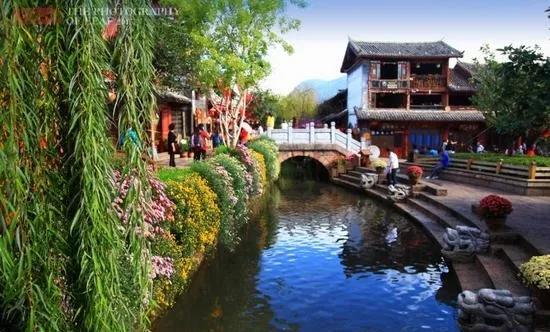Lijiang Is a prefecture-level city in Yunnan Province, located in the northwest of Yunnan Province, the Yunnan-Guizhou Plateau and the Qinghai-Tibet Plateau, connecting Diqing Tibetan Autonomous Prefecture in the north, Dali Bai Autonomous Prefecture in the south, Nujiang Lisu Autonomous Prefecture in the west, Liangshan Yi Autonomous Prefecture and Panzhihua City in Sichuan Province in the east, 527 kilometers away from Kunming City, with a total area of 20,600 square kilometers. Lijiang terrain is high in the northwest and low in the southeast, the highest point is the main peak of Yulong Snow Mountain, 5596 meters above sea level, and the lowest point is the mouth of the Tangba River in Shilongba Township, Huaping County, at an altitude of 1015 meters, which belongs to the low-latitude warm temperate plateau mountain monsoon climate. Due to the large difference in altitude, from the tropical to the alpine climate of South Asia, there are distributions, the four seasons do not change much, the dry and wet seasons are clear, the vertical difference of the climate is obvious, there are more catastrophic weather, the annual temperature difference is small and the temperature difference between day and night is large, and it has both oceanic climate and continental climate characteristics. The average annual temperature ranges from 12.6°C to 19.9°C. There are 93 tributaries of the Jinsha River, Yalong River and Lancang River, including 21 rivers with a basin area of 200 square kilometers or more, and 3 natural lakes in Lugu Lake, ChengHai and Lashihai, of which Lugu Lake is a plateau freshwater lake in Yunnan Province that maintains national class I water quality standards, and is also one of the second deepest lakes in China. The local Mosuo people call it Shenamai, which means Mother Lake or Goddess Lake. Lijiang has a wide variety of plant resources, becoming one of China's famous plant protection bases, is one of the key forest areas in Yunnan Province, there are many tree species belonging to the national rare plants, such as Yunnan hemlock, yew, beech, water green tree and so on. More than 2,000 kinds of Chinese herbal medicines have been found, accounting for more than 3/1 of the varieties listed in the National Pharmacopoeia. Animal resources are abundant. There are 83 species of mammals in 8 orders, 21 families, and 290 species of birds in 17 orders and 46 families. There are rare and endangered animals under national key protection, such as Yunnan golden snub-nosed monkey, clouded leopard, golden leopard, snow leopard, macaque, red panda and schizogfish unique to Ninglang Lugu Lake. There are also plenty of precious butterfly resources.
Special diets are: Lijiang Rice Dumpling Chicken Bean Cold Powder Butter Tea Rice Enema Chicken Stewed Tofu Blowing Pork Liver Naxi Hot Pot Night Mountain Chicken Pickled Sour Fish Smoked Fish Bitter Buckwheat Soup Recipe Naxi Tea Recipe Naxi Native Chicken Yongsheng Oil Tea Recipe
Specialties: Lijiang snow peach, snow tea, spirulina, Lijiang Taliu black bone chicken Xiaoliangshan apple Citron Ziman Begonia fruit Pipa meat Bacon ribs Mother Beibei papaya Cordyceps ginseng... Huaping Mango Yulong Dianzhong Building
Scenery Mingsheng: Yulong Snow Mountain Laojunshan Lijiang Ancient City Lugu Lake Jinsha River Naxi Dongba culture, Mosuo people style... Anago and others
Administrative planning of the jurisdiction: Lijiang Ancient City District Yulong Naxi Autonomous County Yongsheng County Huaping County Ninglang Yi Autonomous County.
